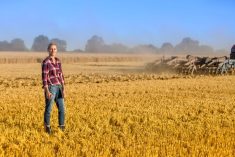Studies show that women have a lot to offer in terms of executive decision-makers on the farm – and there are plenty of lessons agriculture can learn from them.
– April Stewart, CG Associate Editor
Women make great farm CEOs. Did you hear that, Dad? Studies are showing that women have a lot to offer as executive decision-makers, and the reason why has some lessons to teach agriculture about what are the most valuable professional competencies needed on the farm, and why.
Read Also

Executive decisions: what and when to delegate on the farm
Consider the end state you’re working to achieve on your farm when deciding what tasks to delegate, when to do so and on whom, farm management advisors recommend.
What does the research say? One global study showed that women hold about 38 per cent of senior leadership positions, which is not surprising from my experience.
What the study also showed, however, is that when they focused on identifying the most effective leaders within the sample group, women showed up at 52 per cent.
This is significant because it shows women are performing measurably better than men. Why? Well, thanks to analytics, the study was able to sift the data and come to one conclusion: Women are doing better because they are leading more relationally.
Collaboration, teamwork, forming caring connections, mentoring and interpersonal intelligence; these are all competencies where women were shown to be outperforming men.
I’m guessing you may not be surprised by this. I know I wasn’t. I’ve seen this throughout my work in the ag space and even as far back as grad school. Women are very effective in bringing people together and bringing out the best in individuals.
These findings support the need for farmers to develop beyond a technical, task-related focus. The study confirmed what is becoming more obvious all the time: intelligence, hard work and technical abilities are still necessary, but are now basic. They are not enough to set you apart. Indeed, while a strong work ethic and a robust farm skill set still matter, they won’t be enough to guarantee a successful farm.
Don’t get me wrong. I think the need to be a generalist rather than a specialist on the farm is still the right model for most farms in 2020, but the research is clear. The skill set of a top farm CEO is shifting to a balance between technical and relational competencies.
Finding the balance is critical since farmers need to focus their energies where they will have the most impact, and this will require delegating basic tasks to make space for broader demands. In turn, this means that as farm CEOs we need the ability to develop others so we can achieve success through them, not merely by our direct actions.
In my experience, this is a significant step for many growing farms.
As farms become more complex, the skills that are currently giving women an edge in leadership globally are going to be essential on the farm. Are you getting the most out of your external partnerships? Are they effectively working together to solve complex problems?
The Royal Bank of Canada’s “Farmer 4.0” report which describes farm CEOs as “the Deciders” shares this belief.
To be clear, these aren’t superpowers or even inherited talents — but high-impact, learnable skills based on a basic belief that people matter, and that how I interact with others determines the results I get.
Let’s also pause to reflect on how significant being at the top of a leader-effectiveness sample group can be. As I’ve mentioned in previous articles, as well as in workshops and podcasts, leader effectiveness has a strong, positive correlation to business results, and the size of those results aren’t incremental — but tend to be on a Pareto distribution.
That is, the small group at top is achieving way more results than the average, meaning the return on investment (ROI) on developing CEO competencies is also high.
I’m reminded of a TED talk featuring a former air force pilot who asserted the world may be competitive, but there is always room at the top, so focusing on being the best at what we do is a great investment of our time and energy.
Kelly Dobson [email protected] is chief leadership officer of LeaderShift Inc., powering the National Farm Leadership Program initiated by Farm Management Canada for farmers and farm advisors in January 2020.
– This article was originally published in the March 3, 2020 issue of Country Guide.















